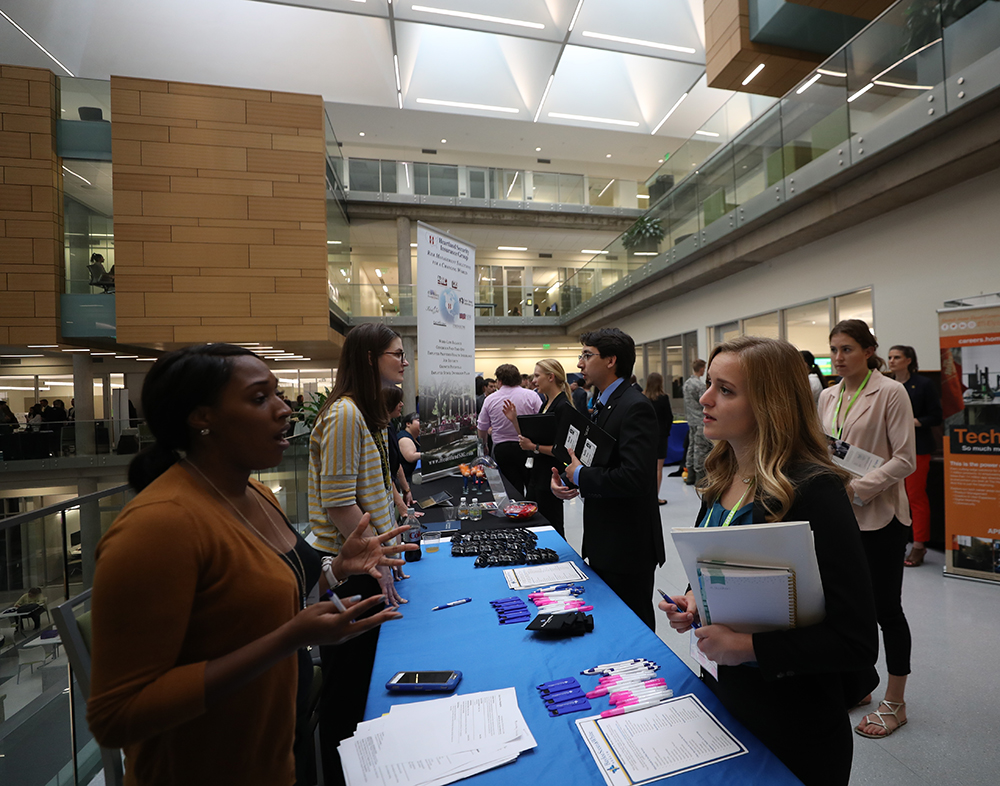Engaged Learning and the Future Workforce

A recent Baylor University—Texas Business Journals survey revealed optimism about the 2020 Texas economy, and plans to expand the workforce in the years ahead. The survey, which featured responses from nearly 600 Texas business leaders, has sparked conversation about innovation, the economy and insights into university-industry research partnerships.
Among the findings, 55 percent of all respondents planned to hire new employees in the year ahead, with companies expecting an average of 26 new hires. Alongside that optimism comes a recognition that expanding their talent pool isn’t always easy. When asked to rate the challenge of finding skilled labor, 76 percent reported it as medium or high.
As universities and industry leaders seek to solve societal challenges, it is vital to have access to experienced leaders and develop future leaders—individuals equipped with the critical thinking and broad-based academic preparation to solve problems and navigate the rapid changes of modern life. Baylor University’s commitment to research at the highest levels and pursuit of R1/T1 status is built on a robust educational experience. The engaged learning environment prepares students even more deeply to be problem-solvers and leaders in the decades ahead.
RESEARCH AND ENGAGED LEARNING
Today’s students expect more than everyday lectures and tests designed to see how well they retain facts—they want to be engaged more fully in their area of study. As Baylor moves further into Illuminate, the university’s strategic plan, students will benefit even more from faculty research—both in and out of the classroom. Professors who share their research in the classroom introduce students to topics that, in many cases, are not yet in textbooks. Students who participate in research develop an aptitude for problem-solving, something business leaders recognize—nearly eight of 10 in the survey said research better prepares students for the workforce.
“As Baylor grows our research profile, a big part of that is engaging students more fully, both at the undergraduate and graduate levels,” Linda A. Livingstone, Ph.D., President of Baylor University, says. “If students are engaged in research, it’s helping them know how to ask important questions, how to study those questions and then to find solutions and apply those solutions.”
Baylor University has long conducted meaningful research, but the focus of Illuminate and the investment by the University in areas such as faculty, post-doctoral researchers, post-graduate programs and purposeful interdisciplinary and university-industry research partnerships will elevate that research portfolio among the top-tier research universities in the nation. With that growth, comes a natural opportunity for students to be engaged in research that impacts societal and industry challenges.
Student research experiences at both the undergraduate and graduate levels can take on many forms—in a university lab, in the field, in a University partnership with organizations like Waco Family Health Center or the National School of Tropical Medicine at the Baylor College of Medicine, or through programs at Baylor built to engage students in research, like the Office for Engaged Learning and Office of Undergraduate Research in Baylor’s College of Arts and Sciences.
“I think research sometimes gets misunderstood as the picture of a student working in a lab cleaning petri dishes or heating chemicals,” Dr. Rich Sanker, Director of Baylor Prehealth, says. “But what we’re really doing is engaging students in opportunities to go deeper in their subject matter, and in interdisciplinary research around it. We want them to think deeply and ask bigger questions about the future, to cultivate a process and methodology for solving problems. One day they’ll be working in the field and run into problems they never read in a textbook. Research at Baylor helps them put together a process to resolve that.”
Opened in 2018, the Office of Undergraduate Research led by Dr. Riz Klausmeyer from Baylor Chemistry and Biochemistry shepherds students into intentional research opportunities through partnerships, internships and other campus opportunities.
“We’re helping students work beyond their major and see everything as interconnected: biology, environmental science, toxicology and more. They see the bigger picture— this office intentionally builds that,” Klausmeyer, says. “Our professors have always been very good at getting undergraduate students into their labs and training them. Now we have an office like this to help, streamlining the process.”
MULTIDISCIPLINARY THINKERS
Embedded within Baylor’s roadmap to R1/T1 research status are five signature academic initiatives that are interdisciplinary in nature: Health; Data Sciences; Materials Science; Human Flourishing, Leadership and Ethics; and Baylor in Latin America.
These five initiatives stand at the intersection of Baylor’s historic areas of strength, disciplines which offer meaningful opportunity for growth, and societal need. Baylor’s focus on these areas will foster interdisciplinary research that helps students develop greater aptitude in addressing the types of challenges they’ll see in a range of industries.
“The challenges students will face in the workforce are likely to be interdisciplinary in nature,” Dr. Nancy Brickhouse, Baylor University Provost, says. “Baylor students should be able to more effectively contribute to research efforts that require different approaches contributed by people with different disciplinary backgrounds. Research is also both an individual and a team sport—much like the world of work.”
Respondents to the Baylor University-Texas Business Journals survey, nearly 80 percent of whom said research better prepares students for the workforce, also said that “evaluat(ing) students as potential future employees” was a significant benefit to research partnerships (32 percent) and that the “quality of talent among university staff and students” was another reason (29 percent) to engage. As the market drives innovation and the opportunities and challenges presented by growth beckon further investigation, business leaders say students shaped by places like Baylor University will be all the more valuable.
“It’s very affirming to learn that business leaders think so highly of research,” President Livingstone says. “We absolutely believe that having some type of research experience is only going to better prepare students for the workforce and to solve problems, in almost any field they could go into. Who out there in business, healthcare, education or any industry wouldn’t want students like that?”